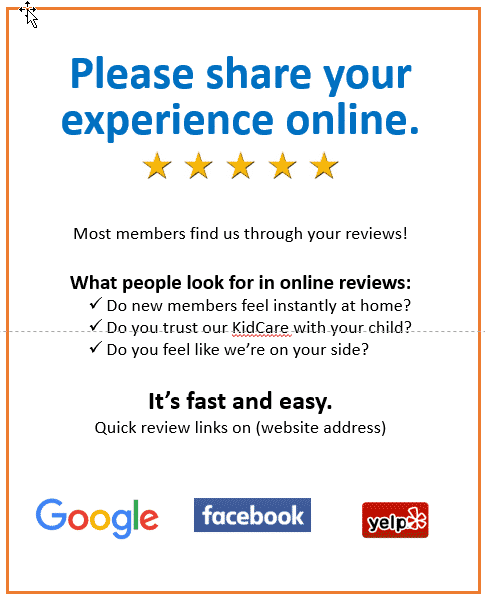Reviews should be the #1 marketing priority for gyms, health clubs, yoga, weight loss, healthy lifestyle coaching, medical practices and pretty much every other local health, fitness or wellness business.
BrightLocal reports that 86% of consumers — and 95% of millennials — read an average of ten reviews before they trust a business. And consumers weigh recent reviews more heavily than older ones.
Lots of sites offer a platform for online reviews, but not all review sites are created equal.
Consider this: Most health and wellness purchases begin with a Google search. Google’s local 3-pack features search results for three — and only three — businesses based on search algorithms that prioritize reviews, among other signals. This applies to everything from health club memberships to weight loss programs, yoga studios, specialty medical practices and more.
That means Google reviews are generally most important, followed by Yelp and then by Facebook.
Worth noting: while not visible to Google’s algorithms at this time, in some communities, NextDoor recommendations are very influential too. Step carefully, here, though — NextDoor audiences are notoriously harsh on businesses that shill on the platform.
Train Your Trainers & Staff to Ask for Customer Reviews
Now that you can see how vital reviews are to potential customers forming opinions, should you ask members to post about your facility on social media sites and review sites?
This is a no-brainer….YES!
This is one of the most overlooked areas of marketing and staff training. Train your trainers and staff on when and how to cue members to post reviews. You have the advantage of frequent in-person one-on-one contact with your members, so use it!
And if someone posts great comments on say, Facebook or Instagram, by all means say something like “Hey, thanks for the awesome review on Facebook, if you had a chance it would really help us out for you to also post that on Google reviews.”
However, do NOT try to script what they will post or where, or try overly or explicitly to influence their review — that’s a big mistake. Clubs usually get the best results when they simply encourage happy members to post.
Now, if you know that prospects have a particular concern, here’s an example of how to cue what members comment on:

Under no circumstances should you offer any incentives for favorable reviews.
Do NOT do this.
Ever.
It is a terms of service violation on all the major independent review sites. If you get caught doing it, your entire business listing can be pulled from Google, Yelp, or wherever. We’ve talked directly with clients who have tried this and been burned, often because competitors reported them.
If you’re not getting plenty of good reviews, the problem is your customer experience, not a lack of incentives.
Besides, incentives usually backfire, and here’s why: People who want the incentive scribble something superficial that’s obviously not authentic.
Prospective members, patients and clients will see right through it. They can tell who really loves your club versus who was going through the motions.
You’ve Got Reviews, Now What?
If you want to copy reviews from social platforms to your business website, that’s fine too. However, it’s more important to have them on the native review platforms — Google, Yelp, Facebook, etc. Still, if you also have an area on your site for reviews, that’s a bonus.
The best way to do it is to assign a staffer to pull the best reviews from the major sites each month. Then, post them on your site unedited and with full attribution consistent with each review site’s terms of service.
And by the way, creating posts with especially great new reviews and posting them on your Facebook business page is also a great idea. Assign a staff member to trickle those out over the month. Follow up on this task to make sure it actually happens.
Do you offer employee wellness or corporate wellness programs? Consider strategically cross-posting selected review comments on LinkedIn, too. Just make sure you do it in a way that’s consistent with the vibe of the platform.
Monitor Your Reviews, Please!
Positive reviews
For positive reviews, respond individually, substantively and authentically to each one. “Like” the post if that’s an option. If you can actually get some back-and-forth going with the reviewer, bonus points!
That might look like:
“Wow, thank you so much. What’s the one piece of advice you’d give new students, looking back on your experience?”
Do NOT post the same fluffy boilerplate over and over, on every review — “Thank you for your feedback, we are always striving to do our best for you.”
Negative reviews
How you handle these depends on the platform to a certain extent. On Facebook, if it’s a vitriolic comment on your page or a paid ad, it’s often a good idea to simply delete it without comment. You certainly shouldn’t get into an argument or take a defensive position.
Remember that responding to a negative review on social media can often be like pouring gasoline on a fire. Facebook rewards your engagement by showing even more people the negative review — and often, the nasty comeback to your reply from the original poster! That’s just not helpful.
Now, if it’s a valid critique, and you’ve addressed it, it makes sense to share that information publicly.
Always respect your client’s privacy
If your wellness business employs licensed healthcare providers like dietitians, licensed professional counselors, RNs, physical therapists or doctors, remember that they’re subject to professional ethics guidelines and potentially, HIPAA privacy restrictions which significantly limit your ability to respond to reviews, whether negative or positive.
It’s up to your customers to decide what they want to disclose. No health or wellness business should ever disclose personal information about its members in a review context.
You can learn more about HIPAA here.
Learn From Your Reviews
Keep yourself honest. If your ratings are “meh” — for example, 3.5 stars on Yelp, 3.8-4.1 stars on Google, look at your wellness center experience with fresh eyes. These are not the ratings that stellar businesses get.
If your fitness studio, weight loss program, or healthy lifestyle coaching program has mediocre ratings, don’t blame the reviewers by telling yourself they “don’t get it”, or “other members really like it here.”
Treating less-positive reviews as outliers, when in fact they reflect the consistently underwhelming experiences by users, is just kidding yourself.
See them for what they are: a strong message that it’s time to fix the experience.
And how about reputation management platforms?
If you’ve ever considered signing up for a review management platform or reputation management platform, we usually advise against it.
Those tools aren’t free, and if you’re creating a great club experience, you don’t need them.
In our industry, they’re most useful only if you’re trying to hide from negative reviews.
And I’m sure you know how we feel about that.




